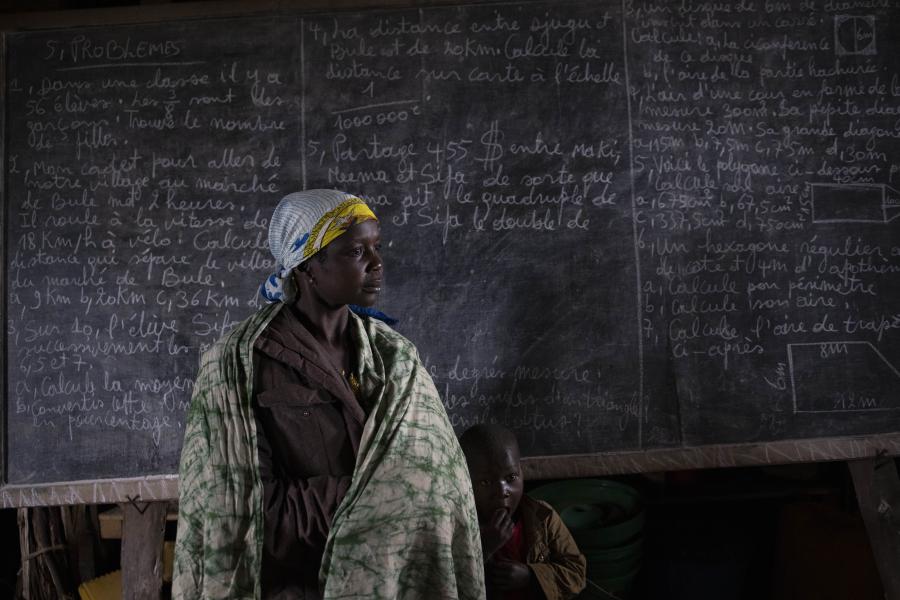2021 Year-end population figures
- Refugees and asylum seekers: 853,000, 50% women and 51% children
- IDPs due to conflict: 5.4 million
- IDP returns: 1.04 million
- Refugees and asylum seekers in the DRC: 526,000
2021 situation overview
The Democratic Republic of the Congo (DRC) remains one of the most complex and long-standing humanitarian crises in Africa, with 5.4 million IDPs due to conflict as of December 2021. At the same time, there were 853,000 Congolese refugees and asylum seekers in neighbouring countries immediately affected by the DRC situation, and almost 1 million Congolese refugees and asylum seekers across the continent as a whole. Most displaced people have fled from the eastern areas of North and South Kivu and Ituri Provinces, and areas in Kasai, Haut Katanga and Tanganyika Provinces.
Intercommunal conflicts and military offensives continued to trigger vast and repeated displacement of millions of people, especially in the east of the country. Gender-based violence remained a major concern, compounded by a weak judicial system and widespread impunity. In May 2021 the President of the Republic declared an état de siège (“state of siege”) for the provinces of Ituri and North Kivu to address deteriorating insecurity. Despite these efforts, several parts of the country remained engulfed in violence and armed conflict at the end of 2021. This overall situation in the DRC was further aggravated by the COVID-19 pandemic, Ebola and measles outbreaks, severe food insecurity, and natural disasters including the volcanic eruption of the Mount Nyiragongo volcano in the east of the country in May 2021.
2021 also saw an increase of 20% in security incidents for humanitarians in eastern DRC, with a spike in kidnappings and increased potential to be targeted in attacks. While UNHCR and partners reinforced security protocols for operational continuity, the situation presented major challenges for humanitarian access and assistance delivery.
For the IDP response, UNHCR led the protection cluster, the shelter cluster and the non-food items working group, and co-led the camp coordination and camp management working group. Under UNHCR’s response in the DRC, 108,000 IDPs received emergency shelter support and 3,000 IDP households received cash grants for rental accommodation; 4,600 reported gender-based violence survivors received psychosocial counselling, 1,900 received legal assistance and 2,600 received medical assistance.
Under the 2021 Regional Refugee Response Plan for the DRC Situation, UNHCR led 66 partners in seven neighbouring countries of asylum to provide multisectoral assistance, protection and solutions. Under the RRRP, in Angola, Burundi, the Republic of the Congo, Rwanda, Uganda, the United Republic of Tanzania and Zambia, 460,000 women received sanitary materials; 284,000 refugee children were enrolled in primary education and 37,000 in secondary education; 76,000 households received core relief items; 76,000 people of concern with specific needs received support (75,000 non-cash and 1,000 cash grants); 50,000 people of concern received legal assistance; 8,400 people of concern received production kits or inputs for agriculture/livestock/fisheries activities; and 2,400 reported gender-based violence incidents for which survivors received psychosocial counselling.
While humanitarian assistance was an essential component of UNHCR’s response, the promotion of sustainable livelihoods and inclusion of refugees into national development plans were also promoted, reflecting the whole-of-society approach of the Global Compact on Refugees.
Meanwhile, the DRC also hosted over 526,000 refugees and asylum seekers who fled from violence in neighbouring countries, mainly Burundi, the Central African Republic (CAR), Rwanda and South Sudan. Notably, insecurity in the CAR during the run-up to and following the December 2020 presidential and legislative elections led to an influx of refugees, mainly into the Congolese provinces of North Ubangi, South Ubangi and Bas-Uele. UNHCR’s multisectoral response to the influx from the CAR provided protection and assistance to more than 72,000 new refugees in 2021, including registration, core relief items and shelter assistance, and access to basic services such as water, sanitation and hygiene, health and nutrition services.
